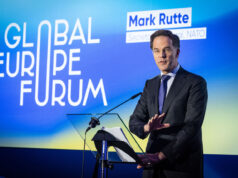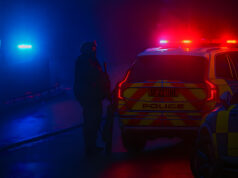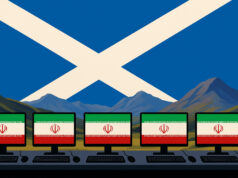Assistant Commissioner Laurence Taylor said the UK’s Prevent programme is under increasing pressure, with record numbers of referrals expected this year and limited capacity across local services to manage them.
At his first media briefing as head of Counter Terrorism Policing, Taylor told assembled journalists that referrals into Prevent, the government scheme that aims to stop people being drawn into extremism, are already outpacing previous years.
“We are on course to having a record number of Prevent referrals this year,” he said. “We would see around 7,000 or 8,000 referrals a year. This year we are at 6,000 already and projecting more than 10,000.”
He told the Home Affairs Committee last week that the increase represents about a 37 percent rise on the usual total. “The capability is there, but I do not think the capacity is there,” he said. “The system is not built to deal with this volume of demand.”
Taylor said the referrals now reaching Prevent are more complex than before, with a growing proportion involving people with “mixed, unclear or no ideology.” Many of those cases, he said, fall closer to social or mental health support than to counter-terrorism. “Prevent is set up to deal with terrorism; it is not set up to deal with all these other things,” he told MPs. “At the moment, one of the challenges we have is that Prevent works, and therefore it becomes the obvious place to put people.”
More than half of the cases sent to Prevent are later closed as non-terrorism matters and passed on to other services. “Over half of those are referred into other organisations, 32 percent into education, 22 percent into health, 18 percent into local authority and 13 percent into local policing,” Taylor said. “They are cases where we have said, ‘This is not a terrorist threat, but we do believe there are interventions needed.’”
Taylor said this pattern reflects a wider strain on the public sector. “There is a risk that we become the big front door for all vulnerabilities,” he said. “We need a multi-agency, well-funded triage process at that front end.”
He described the current system as overstretched but not ineffective. The challenge, he said, is that Prevent is being used to manage vulnerabilities far beyond its original scope. “There is a lot of activity, a lot of demand and a lot of challenge in identifying those people who are thinking about doing something versus those who are going to go and do something,” he said.
Some referrals, he added, stem from misunderstandings about Prevent’s purpose. “We have some examples where you would laugh,” he told MPs. “A kid at primary school who watches ‘Kung Fu Panda’, then goes into school the next day, kicks a pupil and is referred into Prevent. That sort of thing is not what we want.”
Even so, Taylor said it is important that professionals continue to make referrals where they have genuine concerns. “We do not want to stop referrals being made, because we want the professionals to make the assessment,” he said.
His proposal is to develop a coordinated system that can filter cases more effectively and ensure appropriate interventions are available. “If you get this multi-agency effective triage system at the front end that is properly funded, with the appropriate interventions that sit beneath it, you create a system-wide approach rather than what we always do, which is talk about Prevent,” he said.
Taylor said that would allow Prevent to focus on its core purpose. “Prevent can then focus on those things that it is there to do, which is to prevent people from becoming terrorists,” he said.
For Taylor, the issue is not that Prevent is failing he was keen to stress but that it is absorbing problems that were never designed to be its responsibility.














It would be interesting from a national security perspective to understand what is driving the increase.
Is it more investigations into far right activities, which historically have made up a quite low proportion of overall referrals? Or is it the increasing number of unvetted illegal migrants arriving in the UK in recent years, many from warzones deeply entrenched in Islamist ideologies?
Also, what is the cost of this? Especially if our 3.5% aspiration includes spending on security services (can someone confirm if this is definitely the case?)?
You’re forgetting one: The massive increase in people getting offended by other peoples’ viewpoints and the government’s progressive criminalisation of the same (ugly as some viewpoints may be). I’m willing to bet that a lot of these referrals wouldn’t even have been considered anything other than a bit of unpleasant bigotry 5 years ago.
Personally, I think it’s a combination of all three.
This is not rocket science. We all have a dark side and it will start to dominate if we are too stressed and/or not aware of it. Every culture teaches its children fairy tales with a moral message. Red Riding Hood – there are bad people. As a society we have stopped immunising our children against ‘evil’, which is harder to define in a ‘post truth’ society where what I ( big free will) believe is the truth! We need to get back to basics and sending kids to Sunday School. Children need guidelines and standards. This begins in the family. The ‘Prevent’ program is trying to catch individuals who have already gone off track.
Sunday school? You assume most people in the UK devoutly follow the Christian belief system?
I think you would be surprised at how many do not.
Prevent exists due to the rise in Islamist terrorism in the past 30 years
I point at other examples Catholics vs Protestants, Shia vs Sunni … The “doctrine of let’s kill each other because you don’t worship God correctly.”
IMHO religion causes more problems than it solves.
I’m not surprised. My argument is precisely that our abandonment of our Christian heritage is the cause of the problem! Armistice day is upon us. John 15:13, Greater love hath no man than that he lay down his life for his friends. We, or least too large a part of the population do not suscribe to the principle of personal sacrifice for the greater good. We are denying the fons et origo of our identity.
The Pagans could make the same argument, that everything was peace and love and in harmony with nature until Christianity rocked up and kicked off the “us vs them” politics and started persecuting unbelievers.
They could, but who would believe them?
Anyone who is well educated in world history.
You mean the Trojan wars, Ghenghis Khan, the Trojan wars, Tacitus – Tiberius, Claudius, Nero, Bodicea and other idyllic peaceful periods? 🙂
4th Century onwards after Christianity became the state religion of the Roman Empire, some Christian emperors began persecuting pagans, heretics, and dissenters.
Crusades involved violence against non-Christians
Spanish inquisition targeted non-Christians, often using torture and execution.
17th Century witch hunts people got burned and tortured on pure hearsay.
Colonial Period: European Christian powers often imposed Christianity on indigenous populations, sometimes violently.
So how does religion help advance civilisation again?
Well, sometimes the early Christians got a bit overenthusiastic. Nobody is perfect. But the Christian alliancd did stop the Ottoman forces at the gates of Vienna ib 1683, for which you should be grateful. We might have had sharia law and all women in burkas. Roger Bacon, Franciscan friar, philosopher scientific method. Gregor Mendel, Augustinian friar, principles of Mendeliani heritance, Geitge Lemaitre, Belgian priest and theoretical physicist, solution of Einstein general theory for an isotropic universe, linked recession of galaxies to expanding universe – first formulation of Big Bang theory, Luca Pacioli, Franciscan friar, formulator of documented double entry book keeping, Ike Eisenhower, baptised Presbyterian. Michael Gorbachev, baptised Orthodox christian, John F. Kennedy, John F. Kennedy, first catholic president od the United States, Los Angeles, city of angels, San Francisco….the Franciscan end of El Camino. The inspiring and good things in the world are staring you in the face. Time to join up the dots?
“Christian alliance did stop the Ottoman forces at the gates of Vienna in 1683, for which you should be grateful. We might have had sharia law and all women in burkas. ”
And what Muslims failed to do to Europe by conquest back then, they are doing today by demographic change.
Good luck with your Christianity revival it will be a minority religion soon (if it isn’t already)